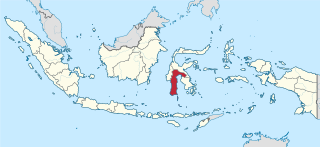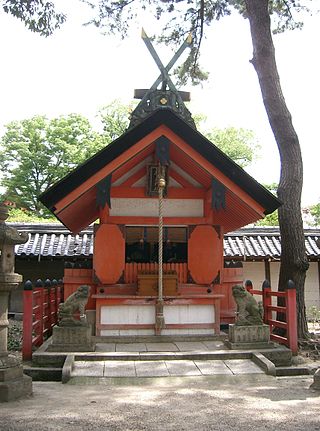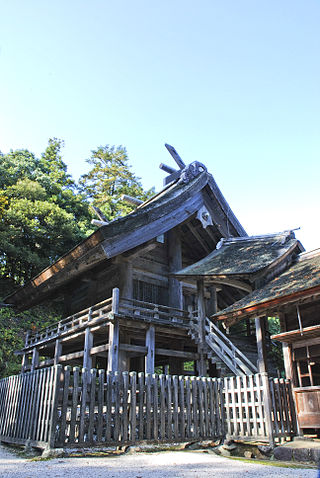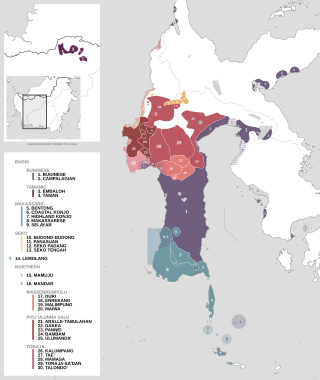
South Sulawesi is a province in the southern peninsula of Sulawesi, Indonesia. The Selayar Islands archipelago to the south of Sulawesi is also part of the province. The capital and largest city is Makassar. The province is bordered by Central Sulawesi and West Sulawesi to the north, the Gulf of Bone and Southeast Sulawesi to the east, Makassar Strait to the west, and Flores Sea to the south.

The Bugis people, also known as Buginese, are an Austronesian ethnic group – the most numerous of the three major linguistic and ethnic groups of South Sulawesi, in the south-western province of Sulawesi, third-largest island of Indonesia. The Bugis in 1605 converted to Islam from Animism. Although the majority of Bugis are Muslim, a small minority adhere to Christianity as well as a pre-Islamic indigenous belief called Tolotang.

Kyōko Kishida was a Japanese actress and voice actress.

The Lontara script, also known as the Bugis script, Bugis-Makassar script, or Urupu Sulapa’ Eppa’ "four-cornered letters", is one of Indonesia's traditional scripts developed in the South Sulawesi and West Sulawesi region. The script is primarily used to write the Buginese language, followed by Makassarese and Mandar. Closely related variants of Lontara are also used to write several languages outside of Sulawesi such as Bima, Ende, and Sumbawa. The script was actively used by several South Sulawesi societies for day-to-day and literary texts from at least mid-15th Century CE until the mid-20th Century CE, before its function was gradually supplanted by the Latin alphabet. Today the script is taught in South Sulawesi Province as part of the local curriculum, but with very limited usage in everyday life.
The Sulawesi forest turtle is a critically endangered species of turtle in the family Geoemydidae. The species is monotypic within the genus Leucocephalon. It is endemic to Sulawesi in Indonesia.

Fumio Kishida is a Japanese politician who served as Prime Minister of Japan and president of the Liberal Democratic Party (LDP) from 2021 to 2024. He has been a member of the House of Representatives in the National Diet since 1993. Kishida previously served as Minister for Foreign Affairs from 2012 to 2017 and as acting Minister of Defense in 2017. From 2017 to 2020, he also chaired the LDP Policy Research Council.

Takeaki Matsumoto is a Japanese politician who served as Minister for Foreign Affairs in 2011. A native of Tokyo and graduate of the University of Tokyo, he was elected to the House of Representatives for the first time in 2000 after running unsuccessfully as an independent in 1996.

Chrysaeglia is a genus of moths in the subfamily Arctiinae. The genus was erected by Arthur Gardiner Butler in 1877.

Sumiyoshi-zukuri (住吉造) is an ancient Japanese Shinto shrine architectural style which takes its name from Sumiyoshi Taisha's honden in Ōsaka. As in the case of the taisha-zukuri and shinmei-zukuri styles, its birth predates the arrival of Buddhism in Japan.
Satara is a genus of moths in the family Erebidae from Sulawesi and South India. The genus was erected by Francis Walker in 1865.

Taisha-zukuri or Ōyashiro-zukuri (大社造) is an ancient Japanese architectural style and the oldest Shinto shrine architectural style. Named after Izumo Taisha's honden (sanctuary), like Ise Grand Shrine's shinmei-zukuri style it features a bark roof decorated with poles called chigi and katsuogi, plus archaic features like gable-end pillars and a single central pillar. The honden's floor is raised above the ground through the use of stilts . Like the shinmei-zukuri and sumiyoshi-zukuri styles, it predates the arrival of Buddhism in Japan.

Shinmei-zukuri (神明造) is an ancient Japanese architectural style typical of Ise Grand Shrine's honden, the holiest of Shinto shrines. It is most common in Mie Prefecture.

Chrysaeglia magnifica is a species of moth in the family Erebidae, subfamily Arctiinae. It was first described by Francis Walker in 1862 and is found in India, Nepal, Sikkim, Borneo, Sulawesi and Taiwan.

Coastal Konjo is an Austronesian language of Sulawesi, Indonesia, which belongs to the Makassaric branch of the South Sulawesi subgroup. It is spoken along the coast in the southeastern corner of South Sulawesi in the regencies of Sinjai, Bulukumba and Bantaeng. It is closely related to, but distinct from Highland Konjo, which also belongs to the Makassaric languages.

Satara everetti is a moth of the family Erebidae. It is found in southern Sulawesi.
Chrysaeglia perpendicularis is a moth of the subfamily Arctiinae. It was described by Karel Černý in 1995. It is found in the Philippines and on Sulawesi.
Satara nympha is a moth in the family Erebidae. It was described by Vladimir Viktorovitch Dubatolov and Yasunori Kishida in 2005. It is found in central Sulawesi.

Phlogiellus is a genus of tarantulas that was first described by Reginald Innes Pocock in 1897. They are found throughout Asia and Papua New Guinea, including Indonesia, the Philippines, Papua New Guinea, China, Myanmar, Malaysia, Borneo, Thailand, the Solomon Islands and Taiwan. Phlogiellus is part Latin and part Greek, the first part being "φλóξ φλoγóϛ", meaning flame, the second part being "ellus" which is a latin diminutive suffix.

Hygropoda is a genus of nursery web spiders that was first described by Tamerlan Thorell in 1894.

The Second Kishida Cabinet was the 101st Cabinet of Japan and was formed in November 2021 by Fumio Kishida, leader of the Liberal Democratic Party and Prime Minister of Japan.














